
The Wisdom of Bees
It seems hard to believe Hive180 Educational Consulting, my business, launched almost 18 months ago. It was a bit of a leap of faith that I could put my experience and training to work and continue to have the kind of impact that is important to me both personally and professionally.
When I was mulling over the possibilities before taking the leap, I enjoyed a book called The Wisdom of Bees by Dr. Michael O’Malley. Dr. O’Malley is a beekeeper, and he is also a social psychologist who trains and coaches management teams. Super smart guy, and those who know me know I gravitate towards smart people hoping to glean lessons from their wisdom and assimilate the learning into my life and practice.
This book that he wrote is not a book for charter schools; it’s a book for traditional businesses that leverages the lessons from the hive in a tangible way. Sipping my coffee at the lake and reading it cover to cover, I had a profound connection to the lessons in this book. THESE are some of the same lessons I’ve been sharing in board and leadership development for a decade in a half.
The book influenced how I envisioned my work, hence the name Hive180 I adopted. I truly hope the lessons I impart will support school boards, leaders, and teachers in transforming their practices. I reached out to Dr. O’Malley and explained who I was and some of my dreams for my work, and told him how much I enjoyed the book. I asked if he would allow me to morph the lessons to address the educational context, and most specifically charters, and he said absolutely!
And so today, I want to start and introduce you to the lessons from the hive.
Why bees? Why not opossums, or chimpanzees, or orca whales? The answer lies in their extraordinary social structure and the sophisticated ways in which they communicate, collaborate, and contribute to the collective success of their hive – a powerful, pervasive, and purposefully developed “bee culture,” not unlike a charter school (or any school). Each bee, though seemingly insignificant on its own, plays a critical role that supports the entire colony. From the queen, who focuses solely on the propagation of the hive, to the worker bees, who labor tirelessly in roles ranging from foragers to nurses, each member contributes uniquely and indispensably. Charters depend on an organizational structure that supports their work, a visionary leader, and each individual staff member and educator working towards that shared vision.
Communication within a beehive is another marvel. Bees use a complex system of dance, known as the “waggle dance,” to inform each other about the location of food sources. This precise and effective method of communication ensures that every member of the hive is informed and engaged, a principle that can be mirrored in the transparent and inclusive communication channels in successful charter schools.
Bees exhibit a unified purpose—survival and propagation of the colony—which drives their actions and decisions. This single-minded focus ensures that personal interests do not overshadow collective goals, a lesson critical for any institution but particularly for educational environments where the stakes are the development and future of young minds.
In the upcoming series of posts, we will explore various facets of the beehive’s functionality—such as division of labor, decision-making processes, and adaptive strategies—that can illuminate best practices in governance and operation of charter schools. By drawing parallels between the hive’s efficiency and the strategic management of educational institutions, I hope you’ll gain actionable insights that foster a collaborative, effective, and nurturing educational environment.
Stay tuned as we delve deeper into the hive mind to extract lessons that can help us build better governed and more collaborative charter schools. And please reach out if I can support your work.
